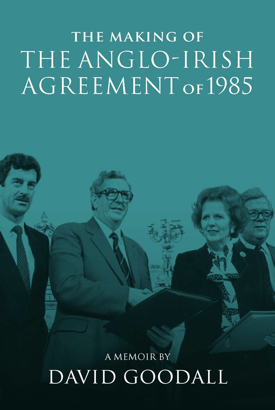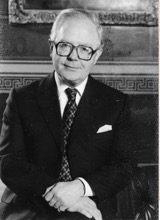16.07.2021
THE MAKING OF
THE ANGLO-IRISH AGREEMENT OF 1985
A Memoir by David Goodall
With contributions by Morwenna Goodall,
Michael Lillis, Robin Renwick,
Charles Powell, Stephen Collins and Maurice Manning
Edited by Frank Sheridan

"The National University of Ireland conferred an
honorary degree on Sir David Goodall in 2015 in recognition
of his significant role in making the 1985 Anglo-Irish Agreement
a reality. We are honoured to have been entrusted with the
publicationof his memoir. We are also pleased to publish this
memoir in which our fourth Chancellor, my predecessor, the late
Dr Garret FitzGerald is such a central figure. The Anglo-Irish
Agreement was the high point of his political career, the greatest
of his many achievements and something which we in NUI are
proud to honour through this publication."
Dr Maurice Manning, Chancellor National University of Ireland
For the first time ever, this unique insider account of the protracted, tense and ultimately fruitful negotiation that culminated in the Anglo-Irish Agreement of 1985 is published in full – offering candid and unparalleled perspective on the key protagonists and the painstaking progress to an accord.
The Anglo-Irish Agreement of 1985 was, without doubt, a significant turning point in historically difficult relationship between the UK and the Republic of Ireland. For many it represents the first major step on the road to a peaceful resolution of the Troubles in Northern Ireland, and was the forerunner to the Good Friday Agreement of 1998 that would see an end to the conflict. For the first time since partition, the Irish government had a right, based in international law, to have a significant input into the processes of the government of Northern Ireland and a permanent presence in Belfast.

Sir David Goodall
Sir David Goodall was the one of two key negotiators on the British side and he kept a personal journal throughout the negotiations. By 1998, he had transformed his diary into a single narrative account that, until now, has remained under personal and official embargo. His elegantly written, highly personal account is gripping and frequently astonishing it its frankness. Goodall captures the heart-stopping fluctuations in the tide of negotiation between the two sides, as it tottered continuously between collapse and survival under Mrs Thatcher’s dislike and distrust of Irish nationalism. Goodall’s memoir describes how, with the persistence and patience of negotiators on both sides, coupled with the genuine desire for resolution from Taoiseach Garret FitzGerald and ultimately Prime Minister Thatcher, that which seemed so improbable was signed by both on 15 November 1985.
Goodall is very candid about the personalities of the protagonists and recounts the sometime dramatic exchanges between the two sides. More surprising are his accounts of the internal tensions on his own side; particularly those between the Cabinet Office and the Northern Ireland Office at political and official levels and those between the Prime Minister and her own negotiators. This is an extraordinary account by a gifted insider of this historic negotiation that anyone with an interest in Anglo-Irish relations must read.
About the Editor: Frank Sheridan is a retired Irish diplomat and, at the time of his retirement in 2014, was Irish Ambassador to Brazil. Earlier in his career he had served in the office of Dr Garret FitzGerald when he was Foreign Minister and as Private Secretary to Foreign Minister, Peter Barry, during the later stages of the negotiation of the Anglo-Irish Agreement of 1985.
The book contains a foreword by Maurice Manning (Chancellor of the National University of Ireland), and an introduction by Morwenna Goodall. There are also contributions from Stephen Collins (columnist at the Irish Times), Michael Lillis (diplomatic adviser to the Taoiseach, Irish Prime Minister, Garret FitzGerald, and David Goodall’s opposite number on the Irish negotiating team), Charles Powell (Mrs Thatcher’s influential Private Secretary during the negotiations) and Robin Renwick (foreign policy adviser to Mrs Thatcher and British Ambassador to the USA).
NUI honouring David Goodall 2015
Further information from:
Dr Attracta Halpin
Registrar
National University of Ireland
49 Merrion Square
Dublin 2, D02 V583
Ph: 01 4392424
www.nui.ie
Twitter: @NUIMerrionSq
Media enquiries: Peter O’Connell Ph: 087 681 4499 peter@peteroconnellmedia.com
Sales and distribution enquiries: Four Courts Press +353 (0)1 453 4668
www.FourCourtsPress.ie
Tweet
« Previous























